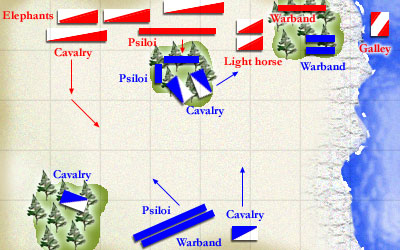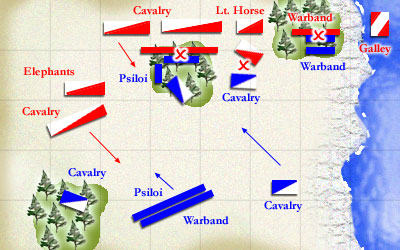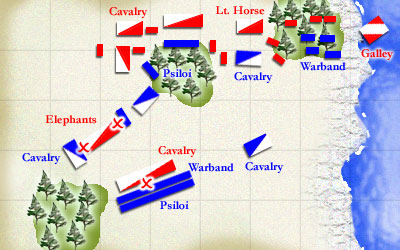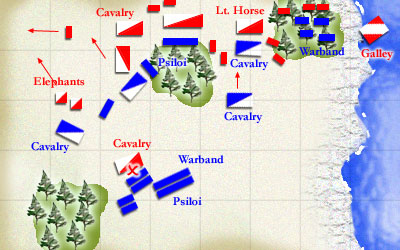The Story in Brief
Montpellier, June 3: The Gauls under Gen. Abix Mullasserix defeated the invading Carthaginians under Gen. Manubal Castablaga in a short and sharp battle here today. The battle was characterised by the ample presence of cleverly concealed ambushes in a battlefield dotted with forests. The lack of open space rendered normal Carthaginian tactics ineffective. To compound this inconvenience the Carthaginian CinC Gen. Manubal failed to modify his strategy when ambushes were revealed in succession. The battle unveiled a new face of Gaelic attack with emphasis on feints and ruses rather than straightforward charges. Accordingly, the number of warriors was limited to the minimum needed while almost all available mounted troops were included in the army.

The Battle in Detail
The Carthaginians deployed their forces in the most Un-Carthaginian way, something old Barca would never have approved of. Restricted by an unfavourable terrain, Gen. Manubal deployed the bulk of his cavalry and all his elephants in the open space in his right flank. His own command he deployed in the centre- right behind the thick forest in the centre. Reports say that the very sight of the looming forest inspired terror in the hearts of the Carthaginian cavalry and the psiloi who went ahead. Knowing the fierce qualities of the Gaelic warriors, Gen. Manubal had opted not to use his spearmen in battle but chose auxilia and psiloi to perform infantry duty. In fact, they did their job well, especially the auxilia who were hidden in ambush in the Carthaginian left flank. An interesting feature of the battle was the presence of two galleys, whose men bore silent witness to the battle. The 1st light cavalry brigade (LH) were deployed in the narrow gap between the two forests and paid a heavy price for the lose of mobility it caused.
"The forces [Manubal] had were accustomed to fighting in Gaul, on level terrain, and against the Gauls, an open-natured people and not at all given to guile, who were accustomed in warfare to rely on their valour, not on trickery. Now, however, he had to try to accustom his men to recognise the guiles, traps and ruses of the enemy, and know when they should pursue and when to give them a wide berth." - Polybius, The Punic War.
The CinC of the Gauls Gen.Abix chose to adopt the tactics of old H. Barca himself. Accordingly, he hid two entire commands in ambush around various sites spread around the battlefield. The only troops visible were those under his own command which included his famed warriors and a few chariots to cover their flanks.The ambushes included everything he could spare cavalry, warriors, chariots and psiloi.Taking the initiative, the Carthaginians ordered a full advance on their right flank and a cautious advance in the centre. The Carthaginian psiloi edged to the limits of the dark woods, more than a trifle nervous and wondering what the green depths had in store for them. Manubal suspected an ambush, but he certainly underestimated the numbers of his invisible foes.

Ambushes are Revealed
The 1st light cavalry raced forward, but their advance was cut short when one whole brigade of Gaelic chariots appeared in their path (in double lines too) and no one could say from where. Gen. Manubal instantly smelled danger and began frantic attempts to save his light cavalry from the charging chariots. His efforts but merely delayed the inevitable charge as eventually the light cavalry ran out of precious space.These setbacks must have had an unnerving effect on Gen. Manubal, for he began to press forward in earnest, than becoming more cautious as one would have expected. Yelling at his aides to 'get the Gauls done with and fast', he ordered his entire right flank forward. Entering the forest, the Carthaginian psiloi were accorded a hot welcome by a more than enthusiastic 3rd warrior's brigade. A series of clashes followed, with the psiloi eventually breaking and fleeing, with the warriors in hot pursuit.
Things did not go well for the Gauls in their right flank. Ordering his 4th warriors forward, Gen. Abix discovered the enemy auxilia hidden in the forest and grimaced as his men took heavy loses, bringing them to the very edge of disaster. The screams of the 3rd warriors matched the yells of their more successful brethren elsewhere. But, for all their loses, they held their ground and eventually broke even. In the meantime, the Gaelic chariots finally caught up with their retreating enemy light cavalry and on a signal from Gen. Abix, they charged. With a resounding clash of metal and armour, the chariots struck the cowering Carthaginian light cavalry head on. The Carthaginian troops put up a hard fight, but were eventually overrun. Their only break came when they managed to cut down two of their opponents with the aid of psiloi who, fleeing from the forest, landed squarely in the flanks of the Gaelic chariots.

The Carthaginians Lose their cool
Really frantic now, Gen. Manubal ordered the troops on his right flank even further into the space between the two forests, and thereby drew himself well into the trap set for him by Gen. Abix. To keep up the facade, Gen. Abix advanced the 1st warriors into the path of the advancing enemy cavalry. Once the enemy was were he wanted them to be he let go with the rest of his ambushers, whom he had been holding back for long. As a shocked Gen. Manubal and his even more shocked elephants watched, the forests to both sides of the main troops came alive with the battle cries of the enemy. The men watched, paralysed, as the woods bore psiloi, cavalry, and more cavalry.
The Carthaginian cavalry reached the 1st warriors and struck with force.
The first round of fights saw the warriors take loses while the Carthaginians merely recoiled. However, things changed in the second round as Gen. Abix got around to flanking his immediate opponents. Bereft of recoil, the charge turned into disaster and rout. The elephants were not doing well either. Taunting and teasing the psiloi hurled stones, javelins and the like at the huge animals (who were not told to expect anything like this!). Before you could say 'quick kill', an elephant was lost and the psiloi, blood thirsty at the sight of their best prey, waited for even more. The lose of cavalry units had a demoralising effect on the whole Carthaginian command. Soon the rest of the elephants were contacted on both flanks by Gaelic cavalry and psiloi. Demoralised, weary and shocked the Carthaginian battle line crumbled before the enemy and quickly scattered. Even as Gen. Abix regrouped his warriors for another assault, Gen. Manubal (seeing his untenable position?) accepted defeat and left the battlefield in a jiffy. A surprisingly short one and half-hours after it had begun the battle was over.

![]() His cloak was black, as black as the war clouds that loomed high over Gaul, and perched on his shoulder was an old raven which croaked often foretelling the terrible fate that beheld his hapless enemies.
His cloak was black, as black as the war clouds that loomed high over Gaul, and perched on his shoulder was an old raven which croaked often foretelling the terrible fate that beheld his hapless enemies.
![]()
Player Profiles
General Abix: The Man in black "His cloak was black, as black as the war clouds that loomed high over Gaul, and perched on his shoulder was an old raven which croaked often foretelling the terrible fate that beheld his hapless enemies". Thus goes the rather dramatic description of Gen. Abix, which is currently making its round of the armies of northern Mediterranean. Well, his tactics are certainly novel and very much Un-Gaul like. Born into a family of businessmen Abix grew up to become a career magician, and under the influence of his peers landed in the army and rose to the rank of General. Known as 'the gentleman Gaul', Abix is said to be bemused at the way in which he is described.
Magic has certainly influenced his outlook on strategy, as was evident in today's battle where ambushes were revealed in true 'magical fashion' in a battlefield where very few people were visible in the beginning. Asked about the reason behind his success, Gen. Abix smiled and said "magicians do not reveal their secrets".
General Manubal: Light Horse Gen. Manubal was born into a warband tribe; but of late he has given himself to becoming a dedicated cavalryman. However, old habits die-hard and surface the moment pressure is applied. Visible in his 'cavalier' tactics is more than a trace of his impetuous ancestry which prompts him to undertake rash decisions in an urge to get the battle over fast with scant regard for the consequences. To date he was lucky, but his luck ran out today at Montpellier. Trapped in an unfavourable position, he must have seen clearly the chinks in his strategy.
Well, cavalry or not, the General needs to restructure his thought and deeds in the battlefield if he is to regain the lost glory of Carthage. A study of the tactics used by his successful peers would certainly help as well.
Observer's Notes: The Valley of Fear
The Gauls have made a strong comeback (of terror) with their current victory against the Carthaginians. As a shaking Carthaginian soldier later told our correspondent 'a veil of terror' is indeed descending on the upper reaches of the Mediterranean which foretells but war and more war for the region. Not that there are no advantages. For one thing a reputation of terror would do well to keep marauders off Gaelic territory. For another, many prominent powers of the region have already commenced diplomatic efforts to establish peaceful relationships with Gaul. It definitely looks as if Gaul has benefited from a change in leadership after all. Let us look forward to see more battles and more terror!
- Credits
-
Players: Abey Mullassery and Madhav G.S. Umpire and Reporter: Manoj E. Govindan Rules: De Bellis Multitudinis